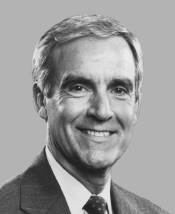Pete Peterson: Difference between revisions
m Spelling philant'h'ropic; break out US's. |
|||
| Line 32: | Line 32: | ||
In 2009, Peterson acquired Australian citizenship.<ref name="webb"/> |
In 2009, Peterson acquired Australian citizenship.<ref name="webb"/> |
||
Peterson is a Senior Director for [[Albright Stonebridge Group]], an international strategic consulting firm. |
|||
==References== |
==References== |
||
Revision as of 20:46, 11 April 2011
Pete Peterson | |
|---|---|
 | |
| Member of the U.S. House of Representatives from Florida's 2nd district | |
| In office January 3, 1991 – January 3, 1997 | |
| Preceded by | Bill Grant |
| Succeeded by | Allen Boyd |
| Personal details | |
| Political party | Democratic |
Douglas Brian "Pete" Peterson (born June 26, 1935, Omaha, Nebraska) was a U.S. Air Force pilot who spent over six years as a prisoner of the North Vietnamese Army after his plane was shot down during the Vietnam War. He returned to Hanoi in 1997 as the first United States Ambassador to Vietnam. He was an ambassador until 2001, after which he devoted himself to philanthropic work.
Biography
Education, military service
Peterson grew up in Milton, Iowa and attended college at the University of Tampa. He joined the Air Force and served in Vietnam, where his F4 Phantom was shot down on September 10, 1966. He spent six years in prison, a period he described as "hours and hours of boredom, spliced with moments of stark terror."[1] He was released March 4, 1973.
Academic, political career
After the war ended, Peterson entered Central Michigan University in order to earn his Ph.D in finance. He later taught the subject as a professor at Florida State University.
In 1990, Peterson ran as a Democrat for a seat in the United States House of Representatives in Florida's 2nd congressional district. He successfully defeated James W. Grant, a politician who grew unpopular after switching from the Democratic Party to the Republican Party in the middle of his second term.
He declined to run for a fourth term (he was succeeded by Allen Boyd), in 1997 was asked by President Bill Clinton to become the United States's first post-war ambassador to Vietnam.[1] One of his goals was securing an account of those still listed as missing in action from the war and so helping to resolve the Vietnam War POW/MIA issue.
In 1995, his first wife had died, and two weeks after his installation in Hanoi met Vi Le, Australia's senior trade commissioner, born in Vietnam, whom he married. In 1999, he moved to Melbourne so they could be closer to her family.[1] On November 17, 2000, he was presented with the Presidential Citizens Medal by President Clinton.
Philanthropy, business
Since retiring as ambassador, Peterson founded The Alliance for Safe Children, TASC, which aims to lower preventable injuries to children worldwide, and focuses specifically on such issues as drowning in Asia.[2] With his wife he started a company whose aim it is to promote American business in Southeast Asia.[3]
In 2009, Peterson acquired Australian citizenship.[1]
Peterson is a Senior Director for Albright Stonebridge Group, an international strategic consulting firm.
References
- ^ a b c d Webb, Carolyn (17 September 2009). "POW's journey to Australia, via love in Vietnam". The Age. Retrieved 8 October 2010.
- ^ "Children from developing world dying of preventable injuries: UN". ABC News. 6 October 2002. Retrieved 5 October 2010.
- ^ "Pete Peterson starts business". Sarasota Herald-Tribune. 27 February 2002. Retrieved 8 October 2010.
- United States Congress. "Pete Peterson (id: P000259)". Biographical Directory of the United States Congress.
- All POW-MIA InterNetwork
- 1935 births
- Living people
- Florida State University faculty
- Florida Democrats
- People from Omaha, Nebraska
- People from Van Buren County, Iowa
- United States ambassadors to Vietnam
- American military personnel of the Vietnam War
- United States Air Force officers
- University of Tampa alumni
- Vietnam War prisoners of war
- Shot-down aviators
- Members of the United States House of Representatives from Florida
- Presidential Citizens Medal recipients
